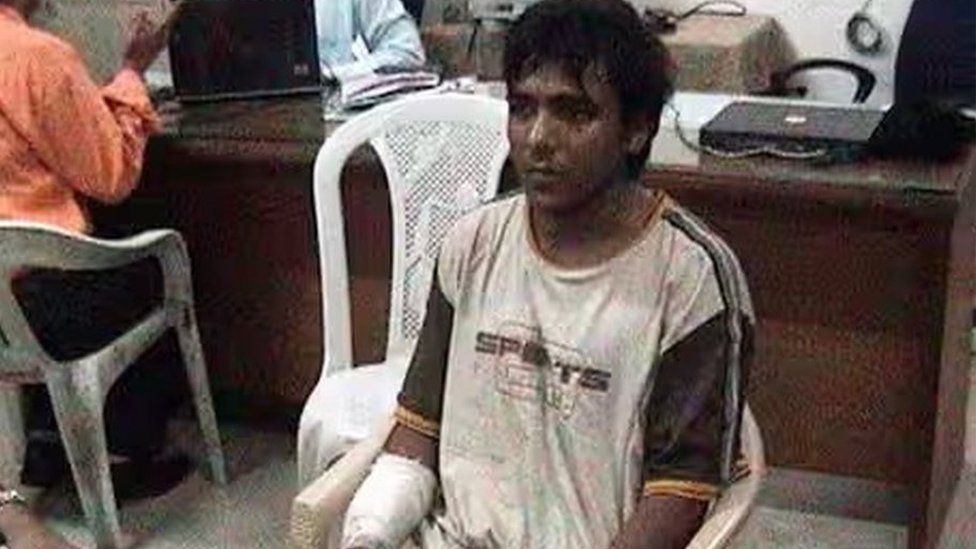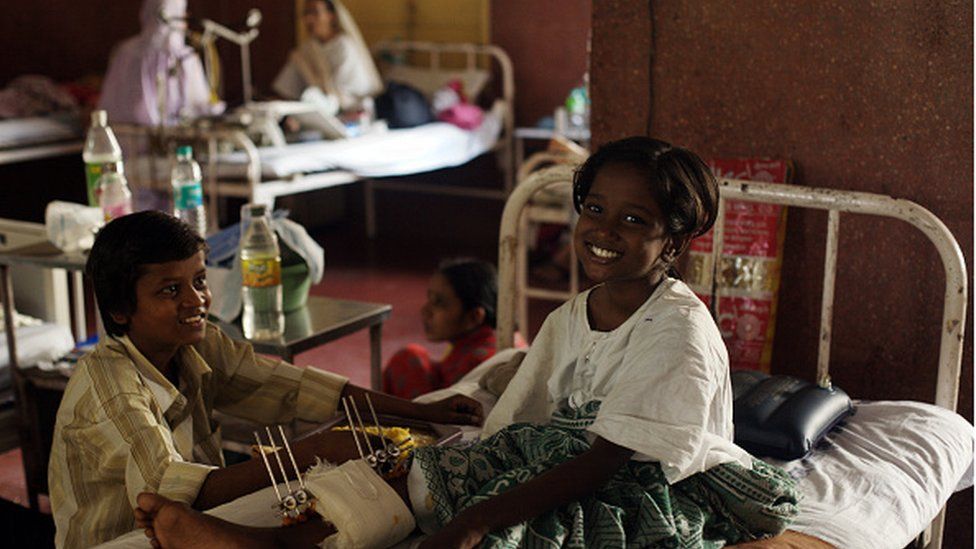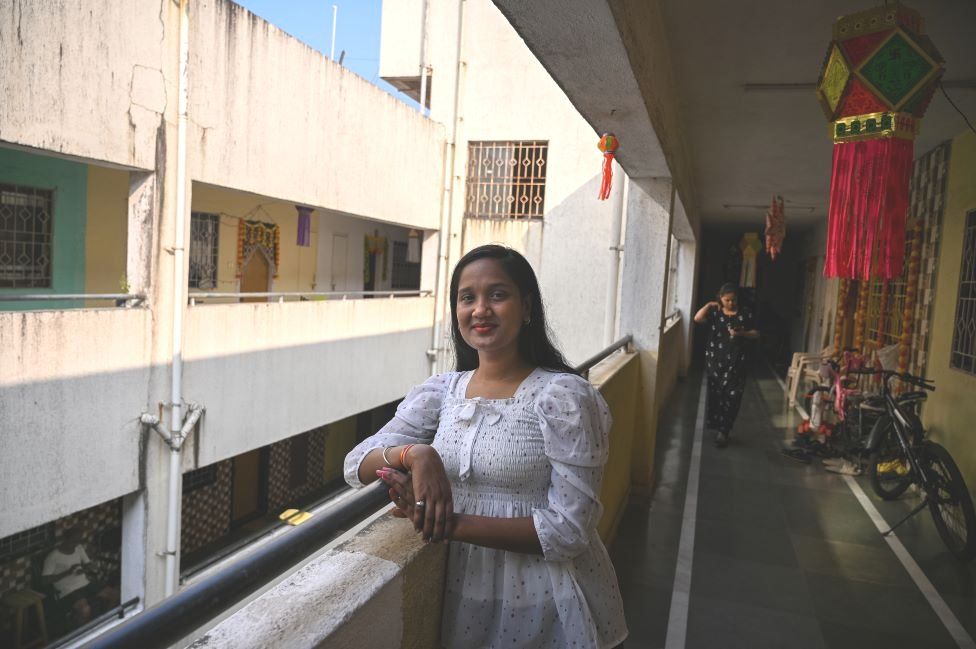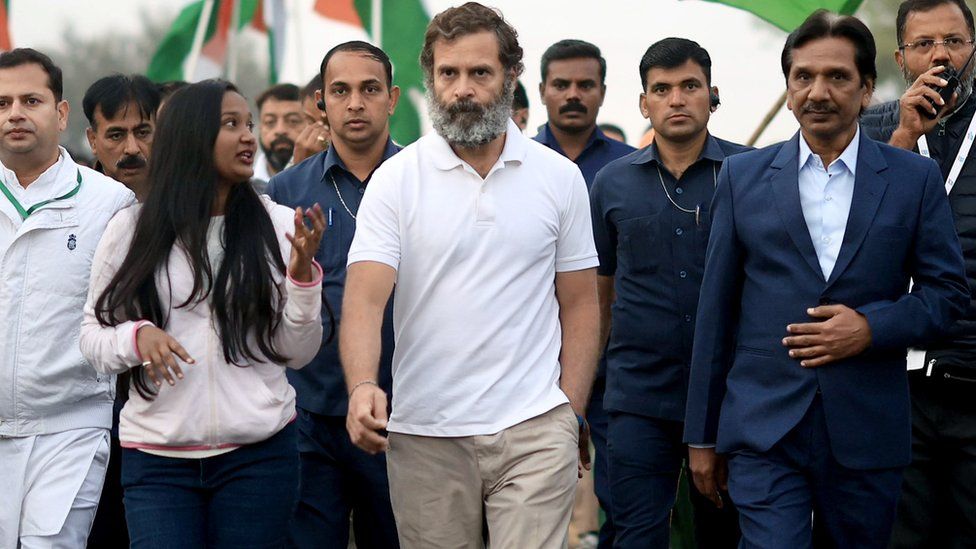At just nine years old, Devika Rotawan survived the November 2008 Mumbai terror attacks. Shot in the leg, she later identified the lone surviving gunman in court. Fifteen years on, the BBC’s Soutik Biswas reconnects with her to explore the changes in the life of a survivor living in the aftermath of the massacre.
I first met Devika Rotawan in a slum in Mumbai in 2010. Barely two years had passed since the frail girl survived the deadly terror attacks that had convulsed India’s financial and entertainment capital.
The 60-hour siege of Mumbai had begun on 26 November 2008. Attacks on a main railway station, luxury hotels and a Jewish cultural centre claimed 166 lives. Nine gunmen were also killed.
A month away from her 10th birthday, Devika had been shot in the leg by Mohammad Ajmal Amir Qasab, the lone surviving gunman from the attack at the landmark Chhatrapati Shivaji Terminus train station. Around 50 people lost their lives, and another 100 wounded in the gunfire at the station alone.
Devika was the youngest witness to give evidence in the trial and identified Qasab in a packed courtroom. She took the oath and answered questions calmly. The media described her as the “girl who identified Qasab”. (In May 2010, Qasab was handed the death penalty, and two years later, hanged in a maximum security prison in the city of Pune.)

When I met her in 2010, Devika was a shy girl, who walked with a limp, smiled a lot and didn’t talk much. Her brother Jayesh lay sick with a bone disease in a corner of their derelict single room home. Her father Natwarlal, who had been a dry fruits seller, was out of work and worried about the future. The family had few possessions – plastic chairs, a trunk, utensils. “I want to be a police officer when I grow up,” Devika had told me.
Earlier this week, I dropped in to meet the Rotawans, marking 13 years since our initial encounter. Devika, now just a month shy of turning 25, has transformed into a radiant and confident woman. They live in a new home, a tiny apartment. These days, she does all the talking, and her father listens.
For all these years, she has breathlessly shared her story with reporters, TV shows, podcasts and public gatherings. Once again, she told the story fluently.
From waiting to catch the night train to Pune, when she heard the sound of gunfire and saw people dropping dead around her. To seeing a “fearless-looking” young man carrying a big gun, spraying bullets in all directions. Then, beginning to run, a bullet piercing through her right leg, causing her to fall unconscious. And returning home after enduring surgery six times and spending 65 days in recovery.
She started attending school regularly for the first time in her life at the age of 11, and the school had initially resisted her admission, saying she would “invite danger” to fellow students. She identified Qasab in a special court in June 2009 – “I pointed my finger at him. He looked at me, and then he looked down.”
Now, her past and present are entirely defined by 26/11.

Mumbai has moved on but the spectre of the attacks casts a lingering shadow on Devika’s life. On her Instagram and Twitter profiles, she goes by the handle Devika Rotawan26/11. On Facebook, she identifies herself as the “youngest victim of the Mumbai terror attack”. Amidst the lively reels of her birthday celebrations and beachside dances to Rahat Fateh Ali Khan’s songs, sombre images unfold: Devika addresses gatherings, pays tribute to victims, and receives not just accolades but often financial support for her courage.
The walls of her home are a frieze of 26/11 memories. There are framed certificates lauding her courage. There are pictures of her meeting UN Secretary General, António Guterres, when he visited Mumbai last year. Trophies neatly line a living room ledge, and a large teddy, swathed in plastic and gifted by a fan club, perches atop the bedroom almirah. As a 26/11 survivor, she’s been a guest on Amitabh Bachchan’s Kaun Banega Crorepati, the official Hindi adaptation of the Who Wants to Be a Millionaire?, and Indian Idol, the Indian rendition of the British show Pop Idol.
And then there’s the media. Whenever a story breaks, highlighting tensions between India and Pakistan, they turn to Devika for a quote, she says. “Sometimes, they barge in, seeking my comments. It can be quite strange at times.” Devika takes all this in her stride, even seeming to savour it. “Whatever you do in your life, make sure at the end of the day you are happy,” she writes on Instagram.

Yet, happiness is hard earned for the Rotawans. Like many others, they find themselves grappling with the challenges of living in a city that’s changing fast. After residing for over 12 years in chawls – affordable tenements with one room and shared bathrooms – they were forced to leave as the neighbourhood underwent redevelopment. Chawls were being torn down to make way for upscale steel and glass towers for businesses and living spaces.
In a space-starved city of 20 million people, where vertical living is increasingly becoming a necessity, the Rotawans ended up taking a modest apartment on rent six months ago – a 270 sq ft (25 sq m) one-bedroom unit on the seventh floor of a “slum rehabilitation building” in the suburbs. However, the 19,000 rupee ($228; £182) monthly rent, adds a strain to their finances, says Devika.
Despite her celebrity status, all is not entirely well. Just as it did 15 years ago, Devika’s fame continues to keep the family afloat.
Natwarlal, 60, has been jobless since his dry fruits business folded after 26/11. Jayesh, aged 28 and now well enough to work, recently found a job as an office assistant, started only a few months ago. Devika received government compensation of just over 1.3 million rupees ($15,600) in two tranches over eight years. After finishing school, she was struck down by TB, affecting her studies. In an ongoing court battle, she’s been pressing the government for a promised home after the attack. A private trust, aiding survivors, covers her college fees.

Last year, Rahul Gandhi, the leader of India’s main opposition Congress party, invited her to join his five-month, 4,000km (2,485-mile) “unity march” across India. She joined in her father’s native state of Rajasthan, she says. The Congress government in the state has gifted her a small plot in the state.
Devika expects to graduate early next year, with a bachelor’s degree in political science and humanities, and wants to sit exams to become a policewoman. “I have also been looking for a job for the last few months, but haven’t found it. It’s worrying because Mumbai is becoming a very expensive city to live in,” she says.
Fifteen years after the tragedy, Devika and her family continue to get by with more than a little help from friends, benefactors and clubs. “We travel by train and plane to shows where they invite Devika to speak, give her certificates and even money,” says Natwarlal.
“We have done hundreds of them. That’s how we survive.”
How long will the “shows” last? How comfortable is she her with her unchanging identity as the girl who identified Qasab?
“This identity was imposed on me. I am not running away from it. I have embraced it,” she told me.
“The only other identity I would love would be a police officer and protect India from terrorists.”
The smile doesn’t leave her. Dreams die hard.
Source : BBC


